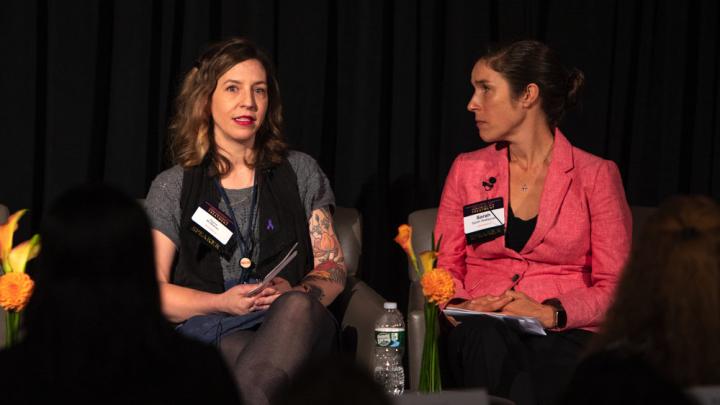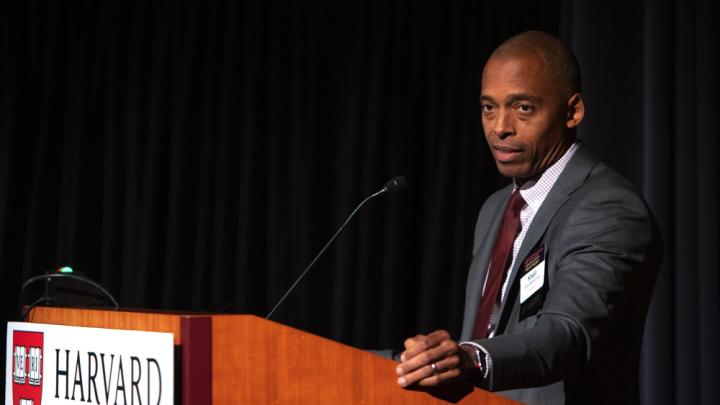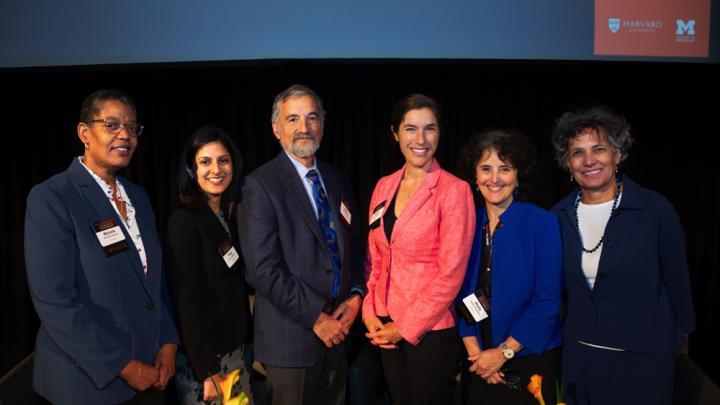The day would be about people and stories, not statistics and graphs, said Harvard public-health scholar Mary T. Bassett at the start of Thursday’s summit on the opioid crisis. And it was. At one point, an Episcopal priest stood up and talked about his grieving congregation back home in Philadelphia and the families there who had lost loved ones to the epidemic. He had traveled to Boston with desperate questions, hoping for a “crash course” in what to do. A Quincy, Massachusetts, police detective spoke of how the opioid problem had begun affecting police officers and firefighters personally; he’d seen several friends on the force lose children to overdoses. And a specialist in harm reduction measures for opioid users talked about getting involved with early syringe-exchange efforts during the 1980s, when friends who used intravenous drugs began dying from AIDS.
Thursday’s event, held on the Longwood Medical campus, was the second half of a scholarly home-and-home between Harvard and the University of Michigan; last year, the two institutions announced a partnership focused on research and solutions related to the opioid epidemic. Among their first collaborations was a pair of summits, co-organized by Chad Brummett, director of pain research at UM, and Bassett, director of the François-Xavier Bagnoud Center for Health and Human Rights, based at the Harvard T.H. Chan School of Public Health (SPH). The first summit, held in Michigan this past May, addressed public policy and medical practices; this week’s gathering in Boston centered on stigma and access to treatment: people and stories.
Raina McMahan, a recovery coach at Massachusetts General Hospital (MGH) who is in recovery herself, spoke on stage with MGH addiction-medicine physician Sarah Wakeman, sharing stories from when she was still using heroin. Her encounters with emergency-room medical staff became so dehumanizing, she said, that she started lancing her own abscesses and treating herself with animal antibiotics stolen from the pet shelter where she volunteered. The first time she tried joining a Suboxone clinic to begin addiction treatment with medicine—“I was desperate for help”—the doctor there berated her until she sobbed. “I was so used to getting treated like this that I expected it.”
“What we have to understand,” Wakeman explained during the panel discussion that followed, “is that we have spent 100 years as a country designing a system that punishes people for using drugs.” (“The Opioids Emergency,” in the March-April Harvard Magazine, covers the work of Wakeman and several other University medical researchers active in the field.) Despite huge advances in the science of addiction and treatment—“We know that medicine saves lives,” she said—stigma and prejudice, and outright criminalization, often keep life-saving help out of reach. Persistent false ideas about tough love or enabling or letting people hit rock bottom can seriously damage recovery, she added. “The definition of addiction is compulsively using a substance despite negative consequences.…How will having more bad things happen help that person get well? And yet, what do we do as a society? We take people’s kids away, we take their jobs away, we put them in cages. We kick them out of our health-care system, and we tell their families to kick them out on the street.”
Even the terminology—“junkie,” “addict,” “clean”—invites condemnation, said Wakeman, who is medical director of MGH’s Substance Use Disorder Initiative and an assistant professor at Harvard Medical School. The word “abuse,” she added, “literally means ‘a willful act of misconduct.’ It would be like describing people with eating disorders as ‘food abusers.’” She echoed the earlier words of SPH dean Michelle Williams, who had kicked off the day’s events by deploring the shame and ostracization that makes addiction-sufferers hesitant to seek care and providers hesitant to give it, and that keeps those in recovery from sharing the experiences that could help others. “Every day that someone goes without medication is another day they could die,” Williams said.
After a while, an audience member rose and introduced himself as Chris Thrasher, a senior director at the Clinton Foundation. “Stigma is something I think about on a daily basis as someone in recovery myself,” he said. The 12-step programs that for many years were the primary recommendation for patients looking to stop using drugs are themselves “based on stigma,” he added, because they don’t allow the use of participants’ full names. “Anonymous is stigmatizing,” Thrasher said. “For so long, when I was using drugs, they didn’t say ‘Chris T.’ in the paper; they said Chris Thrasher was arrested for this, or that, or the other thing.…I’m proud of the person that I am. But I am stigmatized.…And so, it’s a big deal for me to be able to stand up and say, ‘I’m not anonymous anymore.’”
The power of stories—to propel those suffering toward hope and treatment, to demystify addiction, to neutralize shame and stigma—became a recurring theme. “Stories are powerful,” said Jeffrey Samet, a public-health professor at Boston University. “And telling powerful stories—good stories, bad stories—can change people’s perception.” “People don’t see hope in this disease,” said Monica Bharel, Massachusetts’s commissioner of public health, especially when they look at the staggering data on overdoses and deaths. “We need more people telling their stories.” President Lawrence S. Bacow, who initiated the partnership with UM as part of what he calls a commitment to “bring Harvard to the heartland,” spoke of the same thing. “At a time when we hear so much about big data and artificial intelligence,” he said, “it’s actually stories and narrative that help people appreciate what needs to be done.”
Michael Botticelli, executive director of Boston’s Grayken Center for Addiction (and one of several panelists in long-term recovery), contrasted the stubbornly negative attitudes toward addiction with same-sex marriage, which has seen a dramatic rise in favorable opinion during the past few decades. “In no small way, we moved public policy around same-sex marriage by the simple fact of people coming out—coming out to their family, to their friends, to their employers,” Botticelli said. “Addiction has always been considered a disease of the ‘other.’ And part of what we have to do in diminishing that is use our personal voice and our personal narratives to change opinion.”
An even larger story loomed throughout the day: the history of racial double standards in the way addiction has always been stigmatized and criminalized in America. “This epidemic is complicated, and like all epidemics, it tracks along fissures in our society,” said Bassett. She recalled her clinical training in Harlem during the heroin epidemic of the 1970s and ’80s, which mostly struck African Americans. In those days, she said “users were treated with handcuffs and not help.” Historian Khalil Gibran Muhammad, a professor at the Kennedy School and the Radcliffe Institute, and the author of The Condemnation of Blackness: Race, Crime, and the Making of Modern Urban America, delivered the keynote address. He explained how “race helped pour the foundation of our medical, scientific, and political understanding of drug use.” He told the story of how Richard Nixon had actively sought as president to associate black people with heroin, which the government then heavily criminalized.
Two generations earlier, he said, Progressive era liberal reformers had responded to drug addiction among European immigrants and poor whites by calling for less policing and more “prosocial” interventions—better housing and education, new labor laws and pathways to jobs. “They rejected the language of personal responsibility or moral character,” Muhammad said. “They described struggling whites or immigrants as a ‘great army of unfortunates,’ driven to madness, crime, or suicide by an unfair economic system.…By contrast, racist depictions of Chinese opiate use in California and Mexican marijuana smugglers in the Southwest led to vigilante violence” and laws intended to control and contain them. African-American drug users, too, were met with violence and police and imprisonment.
It is important, Muhammad said, not to view this history as an unfortunate error. “It is too easy to lament that we made a mistake with how black people were treated in the twentieth-century drug wars, that now public-health researchers know better. But that would presume that our criminal-justice and public-health systems have been broken all along, and now we just need to fix them.… But these systems were not broken. They were built this way.…We should not deceive ourselves that the system was supposed to produce different outcomes.” The challenge now, he said, is to break the historical cycle.
Other speakers affirmed and expanded on Muhammad’s remarks. Bharel shared data indicating that although the overall rate of overdose deaths has dropped slightly in Massachusetts since its peak in 2016, that rate continues to rise for one group: black men. Public-health consultant Haner Hernández, who earned a GED in prison and a Ph.D. at UMass Amherst, looked out at the largely white audience and asked, “Why declare a crisis now?” His answer: “Because young white kids from the suburbs are dying. In the communities where I come from”—Hernández grew up in Puerto Rico—“we’ve been living a perpetual crisis for decades. And what we’ve gotten instead of a conversation about prevention and treatment is prisons and jails and punitive measures. And if you wonder why the audeince looks the way it does, it's because of how we do things and how we talk about things and our failure to be honest with ourselves.” Those disparities in treatment and attitudes, he argued, damage all of society. “In my house, we’re only as healthy as the sickest person.”
Toward the end of the summit, researchers discussed ways to improve access to treatment. “Quite honestly,” said Botticelli, “this is the only area of health where we let health-care providers treat this as an optional health-care activity—where we don’t routinely screen, intervene, and treat people for this disorder.” Richard Frank, Morris professor of health economics at Harvard Medical School, noted that “on a good day in this country, 3.4 percent of people with an opioid-use disorder are getting treatment to maximize their chances of getting into recovery.” He noted problems of accreditation and accountability—public money often goes to treatment programs operating on long-outdated medical and scientific ideas. And he noted financial limitations: patients in private-treatment programs, most of them young and downwardly mobile, sometimes leave with $40,000 in debt, he said, to audible gasps from the audience. “Going back into the community with that kind of pressure on them dramatically reduces their chance of success.” Botticelli advocated rethinking employment health benefits to routinely include insurance for addiction treatment: “Employers…can play a role in changing culture and climate.” Along the same lines, Amy Bohnert, a UM mental-health-services researcher, presented findings from a 2018 study showing that administering medicine for addiction treatment in primary-care settings, as opposed to specialized clinics, can ease the stigma for patients.
The day closed with a conversation between Bassett and Bacow, in which the president reiterated his commitment to the partnership with UM. Just before they spoke came comments from Harold Koh, Fineberg professor of the practice of public health leadership and former assistant secretary for health at the U.S. Department of Health and Human Services. Thursday’s gathering, he said, reminded him of another one 15 years earlier, a housewarming for a woman who’d struggled for years with addiction and poverty and homelessness. He recalled that she told the assembled health-care workers, “You believed in me when I didn’t believe in myself.” Koh paused. “I’ve thought about that story a thousand times,” he said, “because that’s what this is all about.…People wrestling with substance use disorder need us to believe in them, and to build a system to help them get there.”










